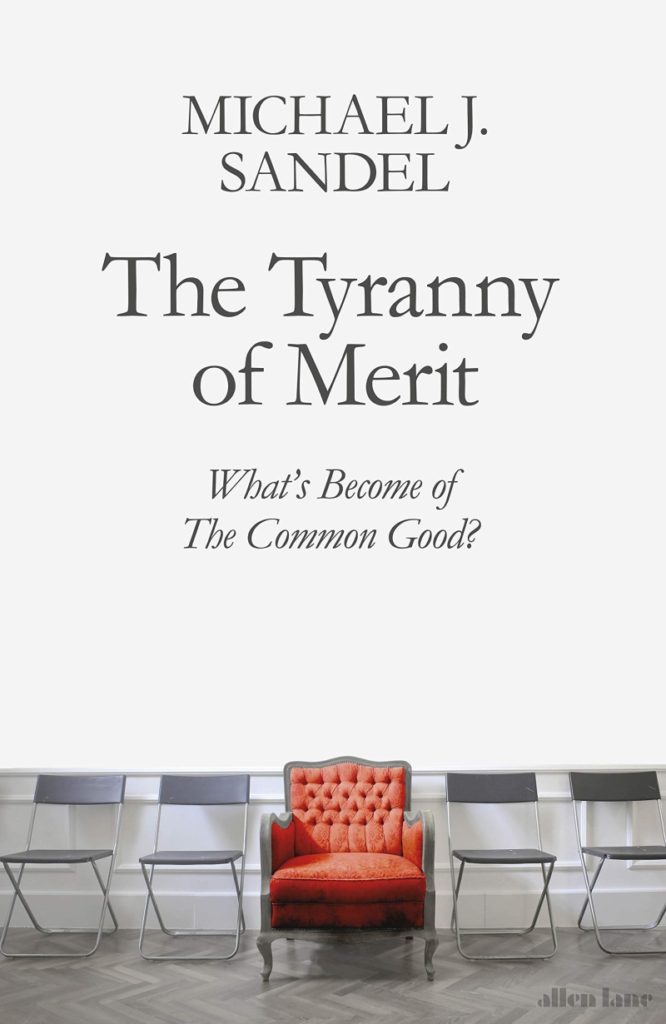The Tyranny of Merit: What’s Become of the Common Good?
Reviewed by Michael Attard.
Merit” refers to a quality of goodness or worthiness so as to deserve consideration, praise, or just reward. And it is generally believed that merit and success are achieved through effort and striving. From among three job applicants, the person with the best qualifications will get the job even if one applicant offered a bribe and the other was related to the company’s vice-president. This is the nature of virtuous merit in a just society.
So, why has Michael Sandel, an American political philosopher at Harvard University, written the book, The Tyranny of Merit: What’s Become of the Common Good?
The short answer is that meritocracy dating back to Confucius, Plato, and Aristotle is not what is practiced today. And the current propensity to see the widening inequity gap as meritorious or just and fair is tearing society apart.

This book will not be to everyone’s liking. One of the seven chapters recounts the history of merit’s beginnings in the religious concept of grace, through the acceptance of the Protestant work ethic, to modern-day positions on freedom and responsibility. Other sections may offer too deep an analysis for some readers. I encourage you, however, to give the book a try. Sandel speaks as if he is lecturing to his first-year students, providing historical context and easily understood statistics to clarify his points.
More importantly, all of us for years now have been trying to understand how such an enormous polarization has occurred in Western political thinking, and now Sandel helps us comprehend one of the greatest debates of our time. His contention is that the polarized politics of Western democracies has its roots in the corrosive nature of meritocracy. He states, “… those who land on the top come to believe that they deserve their success.” They have made it on their own. The implication is that those who land on the bottom deserve their failure. Thus, “… our social bonds and respect for one another come unraveled.” The winners develop hubris while others feel humiliation. This curtails all meaningful discussion, and the problem is exacerbated.
The confronting sentiments of hubris and humiliation are spoken of throughout the book. One might judge that Sandel is unnecessarily repeating himself; I reckon that he believes that we cannot emphasize enough the psychological and social damage created by our distortion of merit.
This harm has led people to believe that there is no alternative to the real political failure other than revolt. It is important to note that the sense of disempowerment does not only pertain to economics, but also to moral and cultural grievances such as the dignity of work and the meaning of success, which I will talk about.
To many, an obvious flaw of meritocracy is inequality of opportunity. The rich have advantages. The often-offered remedy is for people to get an education. But here too is an implicit insult in that we are better than you because we have our credentials. Sandel proposes that governments focus on making life better for those who lack a diploma, again by addressing issues such as the dignity of work.
Educated technocrats and credentialists as winners in society are those who dominate our governments. As those with credentials govern a populace without them, society becomes less democratic. Sandel claims that today’s parliaments more resemble those of the 19th century than they do of the mid-20th century.
I am not sure that I fully accept what Sandel seems to imply about prejudice toward the lesser educated. At one time, a high school education was not necessary, but people adapted to a new world and high school graduation became the norm. If we are to be objective, perhaps those who feel that they are being left behind should assume some personal responsibility for their situation.
Through the topic of globalization, he hones in on the dignity of work. This phenomenon has created inequality and stagnant wages, but beyond the economics is an attack on the dignity of work. Sandel wants us to rethink work. There is dignity in all work and people need to be rewarded with decent pay so that they feel they are participating in the building of society. People want to be producers more than they wish to be consumers.
Sandel notes: “The meritocratic ideal is not a remedy for inequality; it is a justification of inequality.”
Often liberals are confused as to why those they want to help will not support their programs – universal health insurance, for example. They misunderstand that the majority of people are not looking for handouts; they are searching for the dignity of work. They support meritocracy but not in the current form where technocrats determine who is worthy of respect and who is not. They detest liberal ideology focused on give-aways to ethnic minorities and immigrants, thus creating racial divides even though their emphasis is on the dignity of work, freedom, and personal responsibility.
Related to but going beyond work, Sandel believes that we must also re-think the meaning of success. He points out that there is no inherent moral superiority in success. Generally, it is the luck of living in a society that prizes one’s talents. Success is not one’s due and, thus, if attained, should promote humility – the civic virtue we need.
In spite of the subject matter, the book is easy to read. Sandel writes in a peaceful tone and balances his ideas at all times. For example: “Overcoming the tyranny of merit does not mean that merit should play no role in the allocation of jobs and social roles.” And yet he never allows the reader to lose sight of his major points: “It is paramount for society to challenge inequalities of wealth and esteem that are defended in the name of merit…”
His comments come across as reasoned criticism, not as an attack on anyone or an idea. He offers an arbitrator’s perspective that, if adopted, would help us all.
The Reviewer
Michael Attard is a Canadian and has lived in Gwangju since 2004. Though officially retired, he still teaches a few private English classes. He enjoys reading all kinds of books and writes for fun. When the weather is nice, you may find him on a hiking trail.



